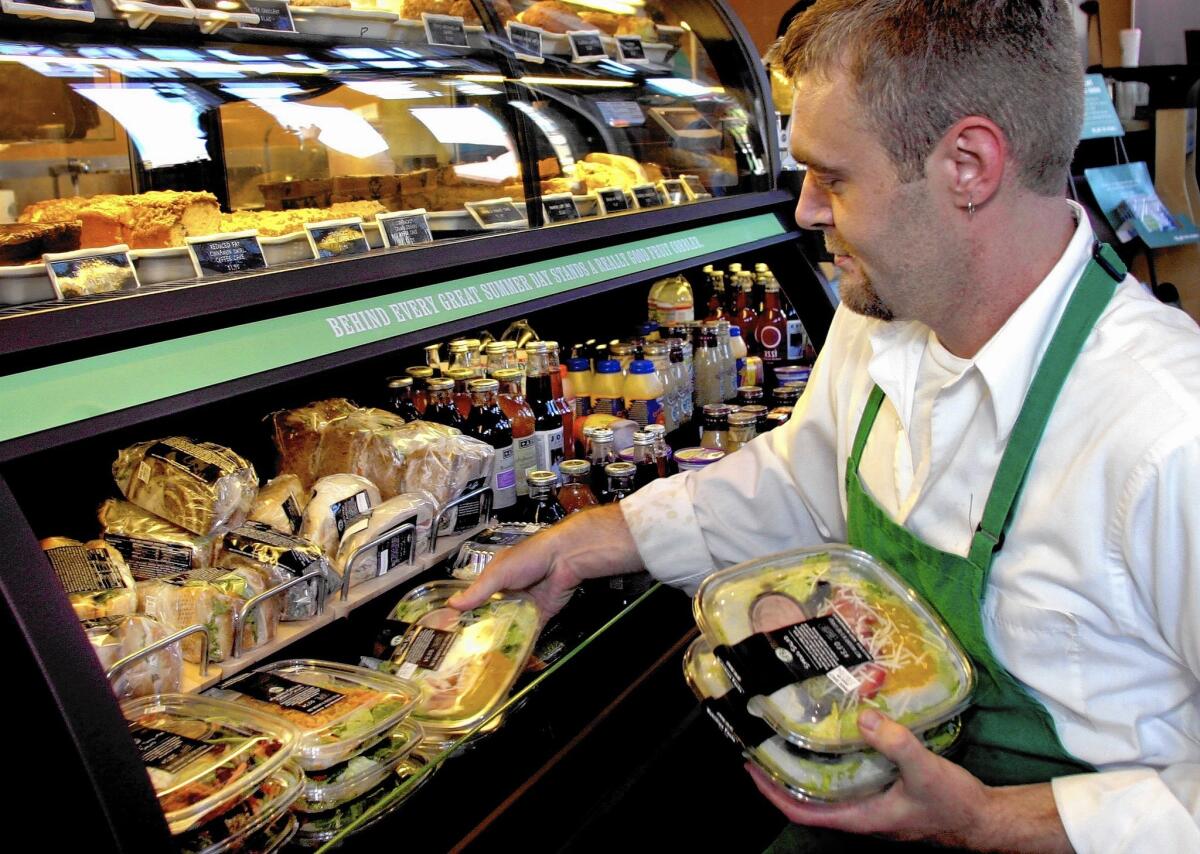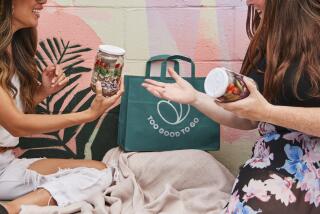Column: Starbucks’ commitment to donate leftover food to charity deserves praise

Let them eat turkey pesto paninis.
Or BBQ beef brisket on sourdough sandwiches. Or zesty chicken and black bean salads.
Starbucks needs no marketing push from me, but I’m here to bestow props anyway. The company has taken a leadership role in addressing domestic hunger by announcing that it intends to donate all its leftover food to charity.
This year, Starbucks aims to provide nearly 5 million meals to food banks nationwide from its roughly 7,600 outlets. Within five years, it says, that figure should rise to 50 million meals annually.
Join the conversation on Facebook >>
“When we thought about our vast store footprint across the U.S. and the impact we could make, it put a fire under us to figure out how to donate this food instead of throwing it away,” said Jane Maly, brand manager for Starbucks’ food division.
“The challenge was finding a way to preserve the food’s quality during delivery,” she said.
Here’s what all other restaurants, hotels, caterers and other food business need to understand: That challenge isn’t insurmountable. Nor is the question of legal liability, which I know from past columns on this topic is the chief concern when it comes to donating prepared food.
The federal government estimates that more than 48 million Americans live in what are called food-insecure households. That means hunger is a constant worry.
Meanwhile, this country throws away up to 35 million tons of food every year, according to the Environmental Protection Agency.
In dollar terms, the Natural Resources Defense Council puts the wasted-food tab at $165 billion annually, or about $2,200 per household.
And there’s another component: By some estimates, about a quarter of the nation’s water is squandered on producing food that will end up taking space in landfills.
Michael Flood, president of the Los Angeles Regional Food Bank, told me that Starbucks’ decision to donate leftover food won’t solve the country’s hunger problem, but it will raise awareness among businesses that efforts can be made to get uneaten food to those who need it.
“In that sense, it’s a big announcement,” he said. “It puts out the message that donating food is OK.”
Organizations like Flood’s have been active for years putting a dent in food waste. They work primarily with manufacturers and retailers to collect unsold packaged and perishable foods, such as canned and baked goods.
Food banks, in turn, oversee distribution of these goods to affiliated entities such as food pantries, soup kitchens and shelters.
Flood said Starbucks’ donations will be relatively easy to handle. Because we’re mainly talking about sandwiches, it won’t be difficult to keep them refrigerated until they’re ready to be eaten.
The most likely scenario, Flood said, is that local food pantries and kitchens will deal directly with nearby Starbucks outlets, arranging to pick up, transport and serve the leftovers.
The greater challenge remains hot food served at restaurants, weddings, corporate functions and other events.
About 1.5 million tons of prepared food is thrown out each year in California alone, according to the state Integrated Waste Management Board.
Many restaurants and hotels don’t donate leftovers to charity because they think they’ll be subject to lawsuits if someone gets sick. What they often don’t know is that the federal Emerson Good Samaritan Food Donation Act shields most donors from legal liability.
The catch is that the law doesn’t protect charities that receive donated food, which must ensure that any meals served meet all local and state health requirements. Many charities will decline donations of prepared food rather than run the risk of serving potentially unhealthy meals.
In April, California’s AB 1826 will start taking effect. This is a law aimed at forcing businesses to divert organic waste, including food waste, away from landfills.
Flood and other advocates for the hungry said this represents a pivotal step toward isolating food waste and thus finding ways to put it to use. At first, that will mostly mean composting. But down the road, it’s likely that there will be improved efforts to channel uneaten food to those who need it.
“It’s a big deal,” Flood said.
Starbucks gets points for doing its share. Not only is it setting a goal of contributing 100% of leftover food to charity but it gives instant legitimacy to food donations.
“Our hope is by taking this first step, other companies will see the possibility for their participation and together we will make great strides in combating hunger,” said Cliff Burrows, group president of Starbucks U.S. and Americas.
I see a business opportunity in coordinating pickup and prompt delivery of prepared food to soup kitchens and shelters — with funding, perhaps, from companies that aren’t directly involved in the food business but want to help feed the hungry.
The pitch: Uber for leftovers.
Help yourself, entrepreneurs.
David Lazarus’ column runs Tuesdays and Fridays. He also can be seen daily on KTLA-TV Channel 5 and followed on Twitter @Davidlaz. Send your tips or feedback to [email protected].
MORE FROM DAVID LAZARUS
Surprise! You’re covered for the hospital, not the doctors
Airlines scrap bereavement fares even as they make record profits
Should a man taken to the ER in an ambulance against his will have to pay the bill?
More to Read
Inside the business of entertainment
The Wide Shot brings you news, analysis and insights on everything from streaming wars to production — and what it all means for the future.
You may occasionally receive promotional content from the Los Angeles Times.











